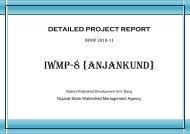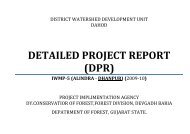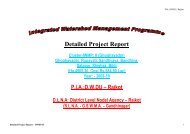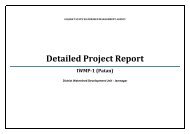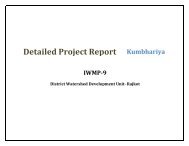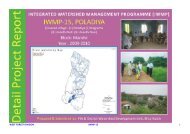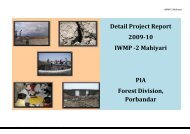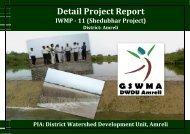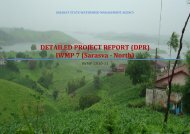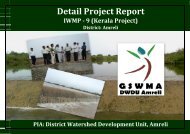IWMP-2 - Commissionerate of Rural Development Gujarat State ...
IWMP-2 - Commissionerate of Rural Development Gujarat State ...
IWMP-2 - Commissionerate of Rural Development Gujarat State ...
Create successful ePaper yourself
Turn your PDF publications into a flip-book with our unique Google optimized e-Paper software.
Detailed Project Report <strong>IWMP</strong>-2<br />
Production System: Organic Manure<br />
Introduction<br />
One major cause <strong>of</strong> poor crop growth in the tropics is the very low inherent fertility <strong>of</strong> the soils. The use <strong>of</strong> chemical Manure to sustain crop productivity on a longterm<br />
basis has not been effective. It <strong>of</strong>ten leads to a decline in soil organic matter content, soil acidification and soil physical degradation, which may in turn lead to<br />
increased soil erosion. The use <strong>of</strong> organic manure has been advocated especially in highly weathered tropical soils.<br />
Organic manure, when properly used, can be a valuable addition to a farming operation’s resource system. It can be an excellent fertilizer and will improve soil<br />
characteristics by adding organic matter. Organic manure may contain a vast array <strong>of</strong> organisms that add to the biological activity <strong>of</strong> soils, however, when not<br />
managed with sufficient care, the nutrients and bacteria can be a major source <strong>of</strong> pollution to watercourses (ditches and streams) and domestic water supplies<br />
(wells and groundwater). Organic fertilizer is the end product obtained by converting various organic wastes such as crop residue, urban wastes, poultry droppings,<br />
animal dung, etc., into a usable fertilizer by a modified aerobic – cum-anaerobic process <strong>of</strong> composting. Organic fertilizer has advantages which include: high<br />
nutrient content; suitability to a range <strong>of</strong> crops; fast biodegradability and safety. lization <strong>of</strong> nutrients, particularly nitrogen.<br />
Organic Fertilizer increases the organic matter content <strong>of</strong> the soil along with the major and minor organic nutrients. The combined interaction <strong>of</strong> the nutrient<br />
ingredients in Organic Fertilizer integrates the soil with the full range <strong>of</strong> nutrients within a relatively short time, and their effects last longer for the standing crop to<br />
benefit directly. By optimally utilizing these nutrients from the soil, crop productivity in the plots treated with Organic Fertilizer greatly increases as reflected in the<br />
high yields and quality <strong>of</strong> the crops. Organic Fertilizer is therefore unique in its action in stabilizing and enhancing the nutrient status <strong>of</strong> the soil, and thereby<br />
increasing crop productivity.<br />
By improving overall physical characteristics <strong>of</strong> the soil and increasing soil organic level, Organic Fertilizer prevents physical compaction <strong>of</strong> soil, improves soil<br />
aeration and prevents leaching losses. Organic Fertilizer encourages the microbial activities in the soil, increasing thereby the organic matter decomposition,<br />
leading to improved soil productivity. Organic Fertilizer not only releases nitrogen, phosphate and potash in a manner easily absorbed by plants, but interacts very<br />
positively with inorganic Manure as well. This interaction allows better and greater utilization <strong>of</strong> nutrients. Organic Manure retain a blanket like cover on the soil<br />
thus enabling it to recapture the moisture level and not let it out. Thus it also helps to recover the stress<br />
<strong>Gujarat</strong> <strong>State</strong> Watershed Management Agency<br />
122 | P a g e



